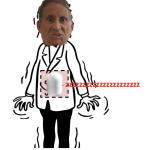Some people just can't admit when they're wrong.
Policy & Ethics
You may have seen a news item a while back when the FDA approved a rather novel new (and seriously weird) therapy for constipation. It's called Vibrant and it's a pill with no drug. Why? Cause it doesn't need one.
Last week I wrote about a study in the prestigious journal Science reporting that a majority of prospective parents favored selecting for fa
He Jiankui, an American-trained embryologist, spent three years in a Chinese prison. Now, recently re-emerged and seemingly rehabilitated, he has re-embarked on his work.
These hidden costs can take the form of resources such as time and money. Most egregiously, they can infringe upon our rights. The quarantining of healthcare workers possibly exposed to Ebola was out of an abundance of caution.
Given that the “truth” will likely never be known, and certainly not provable, the question becomes: is it important to seriously consider the lab leak theory?
A decade ago, most people thought of Tylenol (acetaminophen) as a medicine for fever, malaise and minor aches and pains.
Since COVID-19 made landfall over three years ago, at least 65 laws have been enacted restricting the powers of the State to mandate public health measures. By comparison, only 17 laws augmented state powers.
Join host Cameron English as he sits down Dr. Henry Miller to break down these stories on episode 34 of the Science Dispatch podcast:












